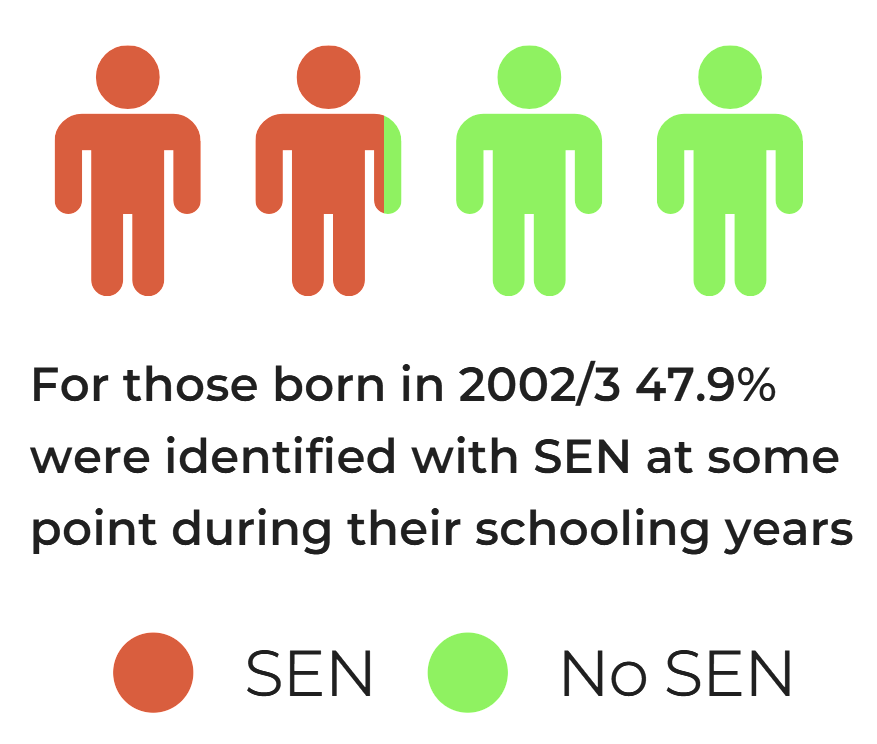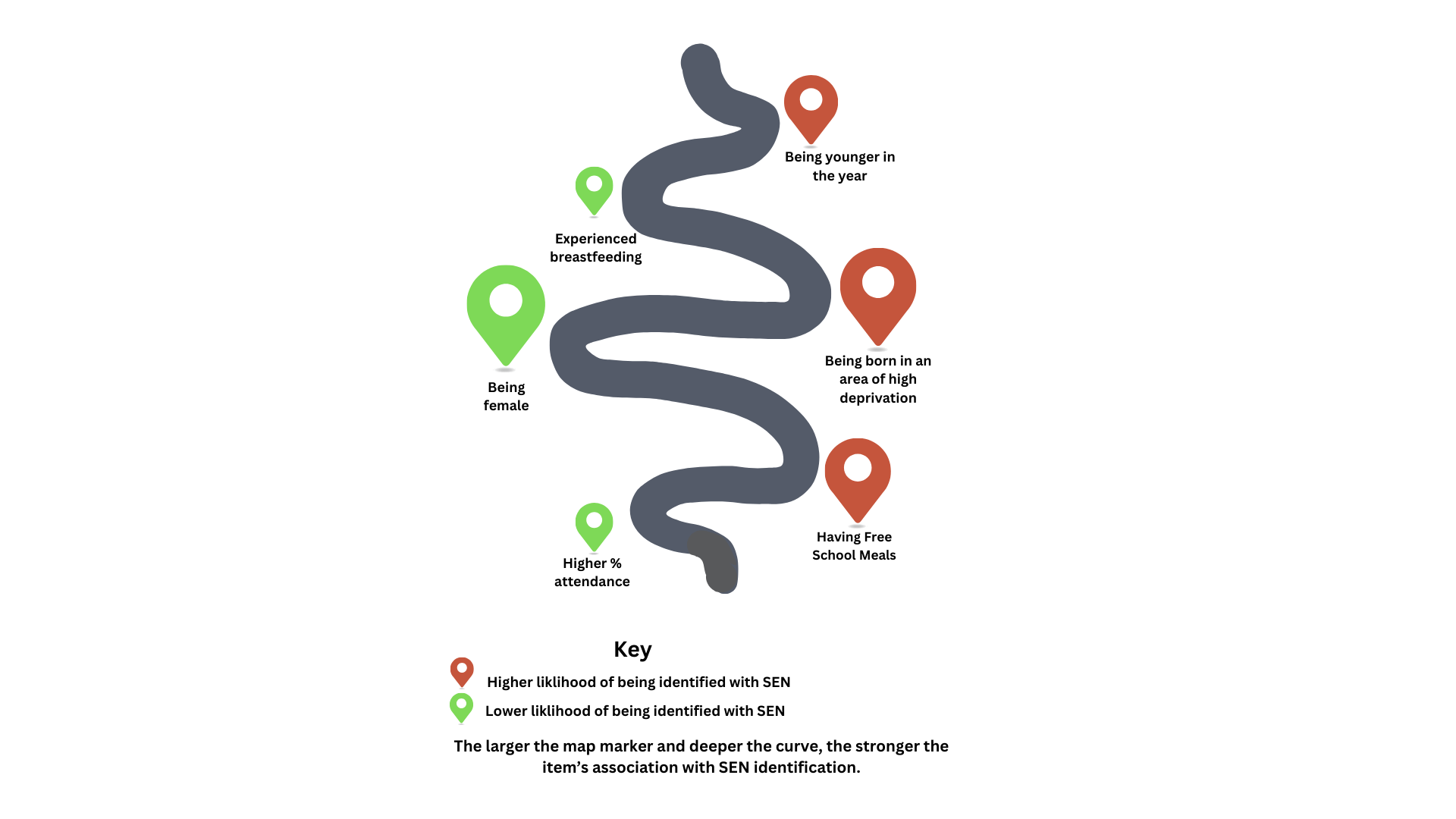Impact of Special Educational Needs identification on academic attainment in Wales

The Welsh SEN/ALN system is currently transitioning to a new statutory support system for those aged 0-25 years with a learning difficulty or disability. The transition phase started in 2022 and involves an overhaul of the system for learners with additional learning needs (ALN), the term that now replaces ‘special educational needs’ (SEN). This introduces a unified legislative framework for children and young people across the broader age range of 0-25 years and replaces statements with individual development plans (IDPs). However, there is currently no rigorous large-scale evaluation of how the previous system was working to support learners identified with SEN academically.
Children with SEN/ALN are known to show poorer academic performance during their school years in comparison to their same-aged peers. This may, in part, be due to the specific issues associated with their particular learning need. While it could be expected that children with SEN/ALN achieve at a lower level than their peers at the time of SEN/ALN identification and intervention, it remains unexplored whether the negative impact continues once a learner has been identified.
This project used data from the SAIL Databank of over 200,000 children in Wales, born between 2002/3 and 2008/9 to explore the predictors of being identified with SEN. The research aims to provide insight into how the previous SEN system in Wales was supporting the academic progression of children with SEN in mainstream schooling, along with providing a baseline from which to view the impact of a major new statutory additional learning needs (ALN) system.
After exploring the data, we employed multilevel models to examine factors influencing attainment over time. We considered sociodemographic (e.g., free school meals, season of birth) and health (e.g., health utilisation) factors while accounting for the hierarchical structure of the data, recognising that students are within schools, and schools are within local authorities.
Key Findings
For those born in the year 2002/3 nearly 1 in 2 learners were identified with SEN/ALN at some point during their education from Reception to Year 11. This challenges the notion that SEN/ALN is an issue affecting only a minority learners. In fact, the impact of SEN/ALN extends across a significant portion of the student population, underscoring the broader relevance and importance of addressing SEN-related concerns in educational policy and practice.
When exploring the predictors of SEN/ALN across all learners in the study, the findings reveal a clustering of SEN within specific demographic groups. Figure 2 shows that when controlling for health-related factors (health utilisation, gestational age and weight, birth anomalies) and ethnicity, environmental variables including having free school meals (FSM), higher levels of deprivation, lower school attendance (%), being younger in the year and not experiencing breastfeeding emerge as influential factors shaping whether individuals were identified with SEN.
 Figure 1: Proportion of learners with SEN in mainstream schools in Wales
Figure 1: Proportion of learners with SEN in mainstream schools in Wales
The school attended by the learner accounted for only 5% of the variation in identification among learners, and the local authority explained even less (0.2%).
We also found that identified SEN was the most influential predictor of attainment. When accounting for numerous sociodemographic and health factors. When the time spent identified with SEN increases, the chances of achieving nationally expected educational outcomes decreases. This underscores the substantial impact of SEN on academic attainment, even after considering sociodemographic and health factors which also predict attainment. Furthermore, the earlier the learner was identified with SEN, the more likely they were to not meet the nationally expected levels of attainment.

Figure 2: Sociodemographic predictors of SEN identification in mainstream learners in Wales
Policy recommendations
• To effectively raise attainment levels, prioritising inclusion should be a central objective across the entire educational landscape in Wales, transcending specific teams to create a cohesive, collaborative effort that addresses the multifaceted challenges associated with SEN/ALN.
• Create frameworks that recognise and celebrate the varied socio-economic and environmental factors influencing learning.
• Teachers should be encouraged to develop skills to create classrooms that celebrate diversity, accommodate different learning styles, and foster a sense of belonging for all students, irrespective of their SEN/ALN status.
• Explore strategies for adapting and refining assessment practices to be more inclusive, taking into account various learning strengths, and needs. Consider incorporating flexible assessment formats (for both formative and summative assessment), personalised approaches, and accommodations.
• Review of ALN identification processes: Examination and evaluation of the current methods used to identify ALN, with a focus on ensuring accuracy, fairness, and inclusivity. In particular, ensuring that all parents/carers and learners are able to navigate the complexities of the new system.
• To allow for the present study to be used as a baseline, the following key information should continue to be collected:
• Attainment indicators at the end of each key stage
• Whether the learner has ALN
• Whether the learner is recognised as having ALN but does not have an IDP
• Sociodemographic measures (particularly in the absence of FSM indicators)
Authors
Dr Cathryn Knight (University of Bristol), Dr Emily Lowthian (Department of Education & Childhood Studies, Swansea University), Professor Tom Crick (Department of Education & Childhood Studies, Swansea University), Carys Jones (SAIL Databank, Swansea University), Sarah Rees (SAIL Databank, Swansea University), Dr Anna Rawlings (SAIL Databank, Swansea University), Yuxin Cao (School of Education, University of Bristol)
Key Findings
Further information about this project can be found here: https://www.nuffieldfoundation.org/project/impact-additional-learning-needs-identification-wales
The Nuffield Foundation is an independent charitable trust with a mission to advance social wellbeing. It funds research that informs social policy, primarily in Education, Welfare and Justice. The Nuffield Foundation is the founder and co-funder of the Nuffield Council on Bioethics, the Ada Lovelace Institute and the Nuffield Family Justice Observatory. The Nuffield Foundation has funded this project, but the views expressed are those of the authors and not necessarily the Foundation. Website: https://www.nuffieldfoundation.org Twitter: @NuffieldFound#
Policy Report 94: July 2024
Special Educational Needs identification on academic attainment in Wales (PDF, 2,468kB)
Contact the researchers
Dr Cathryn Knight
Dr Emily Lowthian
SAIL Databank

